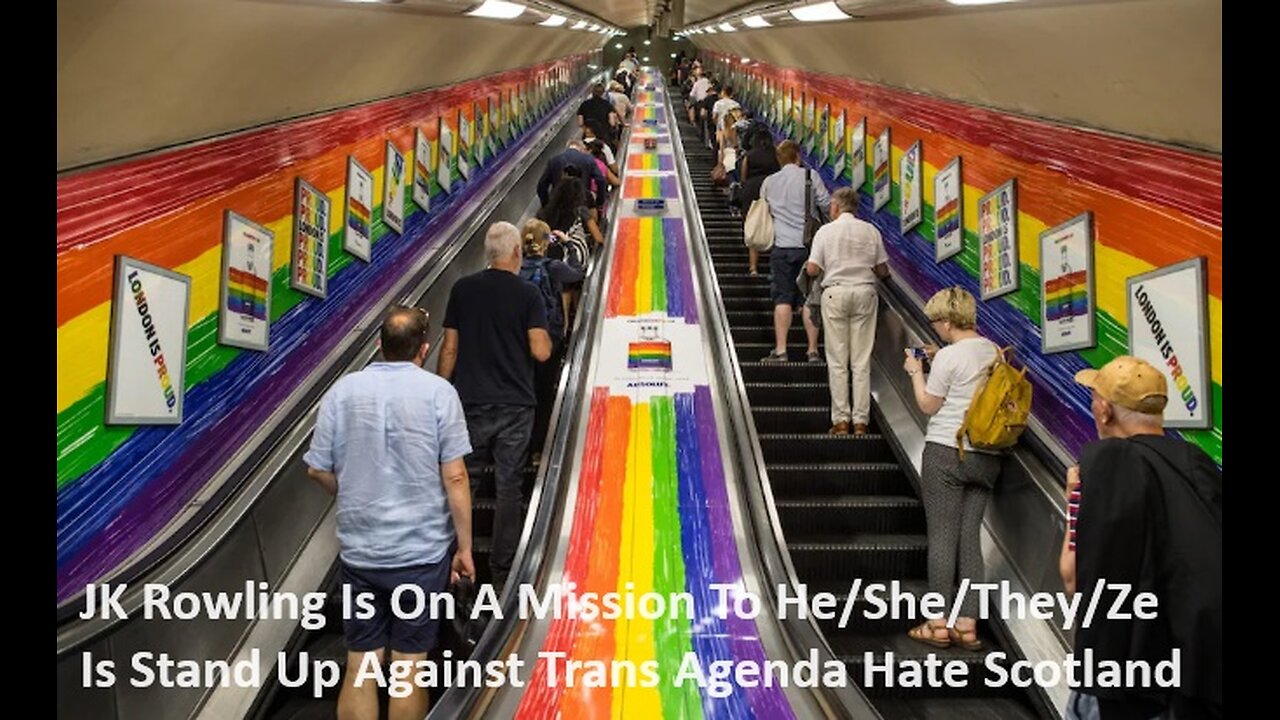Premium Only Content

JK Rowling Is On A Mission To He/She/They/Ze Is Stand Up To The Trans Agenda
So On Easter Sunday "He/She/They/Ze Is Risen!” Critics Ripped Her Speech As Miss Rowling’s Savage Transgender Takedown JK Rowling is on a mission to stand up to the trans agenda. The author of the iconic Harry Potter series and darling of the literary world has come under fire in recent years for refusing to give lip service to the woke trans agenda. Sky News ALl Stars Liz Storer, Clabe Bond and Esther Krakue ask will JK Rowling face dire consequences for her courageous anti-trans stance? And Is A Misgendering Hate Crime Now With Up To 7 Years In Jail...
P.S. The Antifa, Hamas, Isis, Jihadists, Quran, And The Islamic State Ideology Would Also Need To Be Outlawed As Hateful And Violent Practices! But In Scotland The Judge's Said Islamic State And Its People's... They Are Exemption From This New Law 2024.
Myth Of Peaceful Islam And Its Real History Islam Is Not A Religion Of Peace Today - https://rumble.com/v464kkf-myth-of-peaceful-islam-and-its-real-history-islam-is-not-a-religion-of-peac.html
Why are women not protected by new hate crime law? Scotland has introduced a new hate crime law which seeks to protect various categories of people from hatred and prejudice.
Transgender identity is included as a protected characteristic in the legislation. However biological sex is not, to the dismay of some campaigners for women's rights, including the Harry Potter author JK Rowling.
She recently wrote on X that "women gain no additional protections, of course." Could biological sex have been included in the hate crime law?
Yes. The Hate Crime and Public Order (Scotland) Act 2021 was created in response to recommendations contained in an independent review of hate crime laws conducted by a senior judge, Lord Bracadale.
The law updates, and to a certain extent extends, protection from hatred and prejudice relating to age, disability, religion, sexual orientation, transgender identity and being intersex. Race, color, nationality and ethnicity are included too.
Lord Bracadale recommended that women as a group should also be protected in law, although in his report he used the term gender rather than sex or biological sex.
"I am persuaded that there are patterns of offending which relate particularly to the victim’s gender and which should be addressed through legislation which might be seen as falling under the hate crime umbrella," wrote the judge.
Elsewhere in his report, he expressed "some concern" that an approach which focused only on hostility towards women, rather than hostility based on gender, would risk stereotyping all men as perpetrators and all women as victims.
Why are women as a group not included in the new law?
In the end, the Scottish government decided to consider a separate approach to protecting women, writing into the hate crime law, which was passed by the Scottish Parliament in 2021, that sex could be added at a later date.
That happened amid a noisy public debate over the definition of the word "woman" and the law relating to changing gender.
But the SNP-led Scottish government has now said it does not plan to add sex to this legislation, which deals with the crime of stirring up hatred, and offences aggravated by prejudice.
Will women be protected from hatred in another way?
"Women, like everyone else, are already protected from threatening or abusive behavior in law," said a Scottish government spokesperson.
They added that ministers were planning to go further, by introducing a bill to tackle misogyny which would be "the first of its kind in the world".
The law, said the spokesperson, would "create a new focus on protecting women and girls to address criminal behavior motivated purely by misogyny."
The proposal comes after the Scottish government commissioned a report from the human rights lawyer and Labor peer, Baroness Helena Kennedy KC.
It concluded: "We do not recommend the addition of sex as a characteristic to the [Hate Crime Act] as we feel that misogyny is so deeply rooted in our patriarchal ecosystem that it requires a more fundamental set of responses."
Instead, Baroness Kennedy recommended the creation of a separate law to tackle "the spectrum of misogynistic conduct".
She wrote: "While not all misogynistic behaviors will be captured...the shift in thinking and the reappraisal of certain forms of speech and conduct will contribute to a resetting of cultural norms.
“This Act will also depart from the established practice of having law that is neutral with regard to gender.
"We feel that to eradicate misogynistic crimes these laws have to be targeted at protecting women. Treating as equal those who are not yet equal only furthers inequality.”
He, she, and ze: A guide to modern gender pronouns You're due to meet somebody for the first time. Perhaps it’s a colleague for a work meeting, or maybe you've invited your child's new boyfriend or girlfriend over for dinner. You know the traditional rules of engagement: ask their name, shake hands, and maybe exchange some pleasantries about the weather.
But are you definitely using the correct gender pronoun? Is the person you are greeting a “he”, “she”, “they”, or even a “zie”? Until recently, this wasn’t a question that occupied many minds.
But with the rise of the transgender rights movement over the last few years, gender pronouns have become a hot button issue, with many well-meaning middle-aged people finding themselves caught in the middle of a very modern minefield.
Indeed, getting somebody’s gender pronouns wrong can have serious consequences, as Caroline Farrow, a Catholic commentator who debates the issue on television, may have discovered this week. The mother-of-five, who has strong religious views, claims she was asked by Surrey Police to attend a taped interview after she was accused of using an incorrect gender pronoun during a discussion on Twitter.
So, how do you navigate this new ethical quagmire? How do you know which gender pronoun to use? And why does it matter anyway? The University of Wisconsin, in the United States, released a ‘Gender Pronouns’ guide in 2011 which has proved popular, copied online all over the world. It gives some useful answers.
Caroline Farrow, a Catholic commentator, says she asked by Surrey Police to attend a taped interview
How do you know which pronouns to use?
According to LGBT activists, you can’t always tell what somebody’s gender is just by looking at them. Referring to a stranger as “he” just because they “look like a man” is a surefire way to land yourself in trouble, they say. Instead, it could be a good idea to ask somebody what pronouns they use when you first meet them.
Several British universities have gone further, trying to eliminate any confusion by introducing ‘pronoun introductions’, where students will routinely introduce themselves at seminars and student union meetings with their name and “preferred pronoun”. Edinburgh University went as far as handing out ‘pronoun badges’ at its freshers fair last year.
Why do pronouns matter?
“Misgendering” a transgender person can be a hugely unpleasant experience, LGBT activists say. The Wisconsin guide says that being referred to with the wrong pronoun can make transgender people “feel disrespected, invalidated, dismissed, [and] alienated”. They say it can also trigger a person’s gender dysphoria, which is defined by the NHS as the discomfort or distress somebody experiences when their biological sex does not match their gender identity.
Indeed, “misgendering” is taken seriously by police in the UK. Last February, an unnamed schoolteacher was told by police she may have committed a hate crime after she refused to acknowledge that a transgender pupil in her class identified as a boy, failing to address him as “he” and “him”.
Which pronouns should you use?
The most common pronouns are the traditional gendered pronouns he/him/his, for people who identify as men, and she/her/hers, for people who identify as women. According to the Wisconsin guide, however, these should not be described as ‘masculine’ or ‘feminine’ pronouns, “because not everybody who uses ‘he’ feels like a ‘male’ or ‘masculine’.”
Next, there is a long list of gender-neutral pronouns, designed for people who don’t identify as a man or a woman.
The most common of these is they/them/theirs, which have become so popular that ‘They’ was voted as Word of the Year in 2015 by the American Dialect Society. The same year, the Washington Post made headlines after declaring that it was grammatically permissible to use “they” when referring to an individual, and “useful in references to people who identify as neither male nor female”.
Another advantage of “they” is that it already exists in English, a language that has historically lacked room for gender-neutral expression. As a result, LGBT activists have had to invent their own words in recent years.
Show more
The most popular of these newly-minted gender-neutral pronouns is “Ze”, which is pronounced “zee” and can also be spelled “zie” or “xe”. Explaining how to use Ze, the Wisconsin guide compares it to the use of “she”, writing that she = zie, her = zim, hers = zirs, and herself = zirself.
Other less common gender-neutral pronouns include ‘ve’, ‘xe’, and ‘per’, the guide says.
What if you make a mistake?
It’s judgement day. You’ve swotted up on your ‘woke’ vocabulary, and you understand the ins and outs of gender pronouns. You can reel ‘ze’, ‘ve’, and ‘xe’ off your mind as if they were the names of your own children. But disaster strikes, and you make a mistake. What do you do?
Don’t worry, say most LGBT activists, it happens to everybody. All you should do is quickly apologise, correct yourself, and move on.
The Wisconsin guide writes: “Everyone slips from time to time. It can tempting to go on and on about how bad you feel that you messed up, or how hard it is for you to get it right. Please don’t. It’s inappropriate and makes the person who was misgendered feel awkward and responsible for comforting you, which is absolutely not their job.”
What is misogyny?
This is a matter of debate but Baroness Kennedy's definition is "prejudice, malice and/or contempt for women".
She said: "Sadly, it is rife in our society. Literalists cling to the word's origins and insist that misogyny means hatred of women, but it means more than that.
“Misogyny is a way of thinking that upholds the primary status of men and a sense of male entitlement, while subordinating women and limiting their power and freedom.
"Conduct based on this thinking can include a range of abusive and controlling behaviors including rape, sexual offences, harassment and bullying, and domestic abuse.”
What would the new law contain?
The Scottish government proposes to legislate for five separate offences in the new Misogyny Act. These are:
a new statutory aggravation relating to misogynistic conduct where a crime such as assault, criminal damage/vandalism or threatening or abusive behavior is aggravated by misogyny.
a new offence of stirring up hatred against women and girls
a new offence of misogynistic harassment
a new offence of misogynistic behavior
a new offence of issuing threats of, or invoking, rape or sexual assault or disfigurement of women and girls online and offline
Some of the behavior which would be covered by the law is already criminalized in Scotland, as Baroness Kennedy points out.
She said: "Significant efforts have been made to improve the law concerning rape, other sexual offences and domestic abuse, in order to achieve justice for women.
"Unfortunately, many potentially protective laws are hidden away in myriad pieces of legislation and some behaviors are so normalized that law enforcement officials fail to act."
When will Scotland’s new misogyny law be introduced?
The Scottish government said it has already consulted on a draft bill.
It added the responses received will inform the bill it will introduce into parliament "in due course to begin the legislative process".
Ministers have promised to do so during this parliamentary term, which ends in May 2026.
Kilts have been associated with the wider culture of Scotland since the 19th century and have become a symbol of pride and celebration of their Celtic heritage. Although kilts are most often worn by men and trans men and now trans women on formal occasions and at Highland games and other sports events, they have also been adapted as an item of informal male clothing. Kilts are now made for casual wear in a variety of materials. 55% of kilt-wearing men and trans men and now trans women say they wear dark underwear, 38% go commando, and 7% wear shorts or tights. Scottish women are big fans of kilts, with 91% saying it's an attractive look and 67% thinking it's strong and patriotic. Most women and trans women polled by the government in Scotland think nothing should be worn underneath that glorious kilt.
More than 6,200+ hate crime complaints made to Police Scotland so far in one day. Police Scotland has received more than 26,000 hate crime reports in the last 5 days now since a new law was introduced on Monday, the BBC understands. It creates a new crime of "stirring up hatred" over protected characteristics.
A large number were about a 2020 speech by First Minister Humza Yousaf - then justice secretary - highlighting white people in prominent public roles.
Community Safety Minister Siobhian Brown said people were making "fake and vexatious complaints".
Police Scotland said complaints about Mr Yousaf's speech were assessed at the time, with no crime committed and no action taken. The new law will not apply retrospectively.
Prime minister backs JK Rowling in row over new hate crime law
Scotland's new hate crime law comes into force
Hate crime reports are handled by the force's Contact, Command and Control centers.
These have been extremely busy but are understood to be coping with the number of complaints
Ms Brown told BBC Radio's Good Morning Scotland programmed that "misinformation" and publicity had led to the high number of reports.
She also confirmed that a "fake complaint" was made using her name and contact details on Monday.
To be a crime it has to be threatening or abusive with the intent to a stir up hatred towards an individual, which would cause them to have fear or alarm.
Ms Brown described it as a "very, very high threshold for criminality".
She added: "We've been very clear within the act this is not about restricting freedom of expression, it is to protect."
As well as political opposition, a number of high profile individuals including Harry Potter author JK Rowling have voiced frustration at the new law.
Social media comments by Ms Rowling challenging the legislation were not found to breach the legislation.
In a series of posts, she described several transgender women as men, including convicted prisoners, trans activists and other public figures.
Police also confirmed graffiti which appeared near the first minister's Broughty Ferry home had been investigated under the new law.
The Hate Crime and Public Order (Scotland) Act 2021 creates a new crime relating to age, disability, religion, sexual orientation, transgender identity or being intersex.
The maximum penalty is a jail sentence of seven years.
An offence is committed if someone communicates material or behaves in a threatening or abusive manner with the intention of "stirring up hatred" based on these protected characteristics.
Stirring up hatred based on race was already illegal under the UK Public Order Act. This will now fall under the new act in Scotland.
Scottish Conservative MSP Murdo Fraser said the new law was a "massive burden" to police at a time when resources are already stretched.
He told BBC Radio Scotland : "Police time is being taken up looking at which might well be vexatious complaints.
"The way the police in Scotland have been messaging this, actively encouraging complaints, has led to this deluge. Everyone one of which they have said they will investigate.
"I'll be surprised if any of these complaints end up with a prosecution."
What Does It Mean to Misgender Someone? What is misgendering?
For people who are transgender, nonbinary, or gender nonconforming, coming into their authentic gender can be an important and affirming step in life.
Sometimes, people continue to refer to a person who is transgender, nonbinary, or gender nonconforming using terms related to how they identified before transition.
This is known as misgendering.
Misgendering occurs when you intentionally or unintentionally refer to a person, relate to a person, or use language to describe a person that doesn’t align with their affirmed gender. For example, referring to a woman as “he” or calling her a “guy” is an act of misgendering.
Why does misgendering happen?
There are a number of reasons why misgendering happens.
For example, people may notice that a person has primary or secondary sex characteristics and make assumptions about that person’s gender.
This includes a person’s:
facial hair or lack thereof
high or low vocal range
chest or breast tissue or lack thereof
genitals
Misgendering can also occur in situations where government identifications are used. The Transgender Law Center’s report on changing gender markers reveals that in some states it isn’t possible to change your gender on documents such as driver’s licenses and birth certificates. And in some states, you must have undergone specific surgeries in order to do so.
According to the National Center for Transgender Equality’s 2015 U.S. Trans Survey, only 11 percent of people surveyed had their gender listed on all of their government IDs. 67 percent didn’t have any ID with their affirmed gender listed.
In scenarios where government IDs need to be presented — such as at government offices, in schools, and in hospitals — people who haven’t changed their gender markers can be subject to misgendering. In many cases, people make assumptions about their gender based on what’s listed on their IDs.
Of course, misgendering can also be a deliberate act. People who have discriminatory beliefs and ideas about the trans community can use misgendering as a tactic for harassment and bullying. This is evidenced by the 2015 U.S. Trans Survey, which found that 46 percent of respondents experienced verbal harassment because of their identity, and 9 percent had been physically assaulted.
How does misgendering affect people who are transgender?
Misgendering can have negative consequences for a transgender person’s self-confidence and overall mental health.
A 2014 study in the journal Self and Identity, asked transgender people about their experiences with being misgendered.
Researchers found that:
32.8 percent of participants reported feeling very stigmatized when misgendered.
Genderqueer folks, and people who had taken fewer steps in the transition process, were most likely to be misgendered.
Those who were misgendered more frequently felt that their identity was very important, but experienced lower self-esteem around their appearance.
They also had a reduced sense of strength and continuity in their identity.
“Where I’m at school now there are way less trans and nonbinary folks, no visible trans community, and while our equity training included a video on pronouns, none of my professors or colleagues have ever asked what my pronouns are,” N., 27, said. “When someone misgenders me at school I just get this shock of painful tension throughout my body.”
When you misgender someone, you also run the risk of outing them to other people. It’s never anyone’s right or responsibility to out a person who is transgender without their express consent. It’s a trans person’s right and their right alone to tell others that they’re transgender, depending on whether they wish to be out or not.
Outing a trans person is not only disrespectful of their boundaries, but can also result in that person experiencing harassment and discrimination.
And, discrimination is a major issue for the trans community. The 2015 U.S. Trans Survey found these startling statistics:
33 percent of trans people surveyed had at least one experience of discrimination when seeking medical treatment.
27 percent of respondents reported some form of employment discrimination, whether it was being fired, mistreated at work, or not hired because of their identity.
77 percent of people who were out in K-12, and 24 percent of those who were out in college or vocational school, experienced mistreatment in those settings.
Why do pronouns matter?
For many — though not all — people who are trans, a shift in pronouns is an affirming part of the transition process. It can help a trans person and the people in their lives start to see them as their affirmed gender. Getting a person’s pronouns wrong is a fairly common example of misgendering.
Pronouns are terms we use to describe ourselves in the third person in place of our name.
These can include:
he/him/his
she/her/hers
they/them/theirs
gender-neutral pronouns, such as ze/hir/hirs
While there’s been some controversy around the use of gender-neutral pronouns — particularly the use of they/them/theirs as a singular pronoun as opposed to a plural one — public acceptance of the singular “they” has grown in the past several years.
Merriam-Webster came out in support of the singular “they” in 2016, and the American Dialectic Society, a group of professional linguists, voted it their 2015 “Word of the Year.”
Thankfully, all you need to do to get it right is ask! Be sure to offer up your own pronouns when you do.
AUTHOR’S NOTE
It often feels difficult to ask people to use the correct pronouns for me, especially since I use they/them/theirs. People tend to push back or struggle to make the adjustment. But, when people get it right, I feel really affirmed in my nonbinary identity. I feel seen.
What can you do to prevent misgendering?
Stopping your own misgendering behaviors and encouraging others to do so is an easy and effective way to support the trans people in your life.
Here are a few things you can do to prevent misgendering and affirm a person’s identity:
1. Don’t make assumptions.
You might think you know how someone identifies, but you can never know for certain unless you ask.
2. Always ask what words you should use!
You can ask people specifically or ask people who know a given person. Or, you can simply get in the habit of asking everyone their pronouns and terms they use for themselves.
3. Use the right name and pronouns for the trans people in your life.
You should do this all the time, not just when they’re around. This signals the proper way to refer to your trans friends to other people. It also helps you get accustomed to saying the right thing.
4. Avoid using gendered language to speak to or describe people unless you know it’s the language that a particular person prefers.
Examples of gendered language include:
honorifics such as “sir” or “ma’am”
terms like “ladies,” “guys,” or “ladies and gentlemen” to refer to a group of people
typically gendered adjectives such as “handsome” and “beautiful”
Practice using these gender-neutral terms and forms of address instead. You can say things like “my friend” instead of “sir” or “ma’am,” and refer to groups of people as “folks,” “y’all,” or “guests.”
5. Don’t default to gender-neutral language if you know how a person wishes to be addressed.
It can seem like using the singular “they” to describe everyone is a safe bet, and sometimes that’s actually a good way to navigate a situation where you’re uncertain how a person identifies. But, it’s important to respect the wishes of people who have specific gendered language that they want you to use.
6. Avoid using passive language.
Instead of saying: “X identifies as a woman” or “Y prefers he/him/his pronouns,” say things like “X is a woman” or “Y’s pronouns are he/him/his.”
At the end of the day, know that it’s fine to make a mistake here or there so long as you don’t make a habit of it. If you do make a mistake, just apologize and move on.
“If you need to correct yourself, do it and move on,” said Louis, a 29-year-old nonbinary person. “Don’t apologize profusely unless that’s what the other person wants. It’s not the trans person’s job to accept your apology or make you feel better for your misgendering them.”
The bottom line
Misgendering is a difficult issue for trans folks. You can show support and compassion for the transgender people in your life and in your community by being conscious of your participation in it and taking these simple steps to avoid doing so.
The Hate Crime and Public Order (Scotland) Act 2021 was passed by the Scottish Parliament on 11 March 2021 and received Royal Assent on 23 April 2021. The Act modernizes, consolidates, and extends existing hate crime law in Scotland. It aims to recognize the particular impact and harm caused by hate crime to the victim, the group to which the victim belongs, and to wider society. Existing hate crime legislation remains in force until the Act comes into force. The Act provides three overarching aims: victims of hate crime are treated with fairness, compassion, and in a trauma-informed manner in which their safety and recovery is a priority; the nature, characteristics, and extent of hate crime in Scotland are more fully understood and effectively inform appropriate interventions and policy development.
Hate Crime Bill: Humza Yousaf faces anger as law gives protection for ‘cross-dressers’ but not women.
HUMZA Yousaf was slated tonight as his Hate Crime Bill protected "cross-dressers" — but not women.
The Justice Secretary’s controversial law introduces an offence of “stirring up hatred” against groups with “protected characteristics” of race, religion, disability, transgender identity, sexual orientation and age - punishable by up to seven years in jail.
And the Bill sets out that a person could be considered as transgender if they are “a person who cross-dresses” or defined by several other descriptions.
But Labour MSP Johann Lamont - backed by a list of other MSPs - were angry that the Bill does not provide protection for women, but does for cross-dressers.
Tonight, Ms Lamont said that the Scottish Government recently confirmed that they hold no data on cross dressers being a target of hate crime - despite collecting data on the characteristic from 2009.
However, she pointed out that women, goths, and homeless people are not covered by the Bill - despite plenty of evidence they have been targeted for serious offending.
Ms Lamont told the Scottish Parliament: “The Cabinet secretary has talked about ‘a man who is not a trans woman but wears a dress for a drag performance’.
“The Equality Network has brought up the example of a man dressing up for a night out at the Rocky Horror Show, and also of men who cross dress for what they term ‘emotional need’.
“When women are would be likely to be recognized as cross dressers is obviously much less clear.
“Why do we believe occasional hatred to crossdressers should be covered in this bill, but not hatred towards all the other groups I have mentioned, but most especially women.”
In response, Mr Yousaf said: “In my view these amendments would limit the protections in the Bill and remove protections already provided within the existing definition of Transgender identity within the offence as aggravation by prejudice, Scotland Act 2009.
“While ensuring existing protection is not lost which is a very important point indeed, people who cross dress are also included in the Bill because they experience hate crime.”
However, SNP and other MSPs rejected separate amendments that would have added sex to the protected characteristics, and also removed the protection for cross dressers from the Bill.
The move prompted outrage online with thousands of women posting the hashtag #iamthestorm in response to sex not being included.
One woman fumed: “Welcome to McGilead, a country so progressive that men on a stag do, wearing dresses, have more rights than actual women.”
Another said: “Scotland, under the first female FM, has become a place where women discussing, challenging and debating issues regarding their sex is fast becoming a crime. They can’t win the argument so they have made the argument a crime.”
The Hate Crime and Public Order Bill will be voted on today(THURS), after being delayed by debates on changes yesterday.
Mr Yousaf was forced to U-turn on the controversial clauses last September to make it clear “intent” to stir up hatred must be proved - with the original text saying Scots could be prosecuted just for being “likely” to whip up hatred.
Opponents say the law could see cops hit with a barrage of bogus reports and therefore have a “chilling effect” on freedom of speech say - such as on controversial issues like trans rights.
The real crime in Scotland is questioning Sturgeon’s transgender madness. WHAT a hateful place Scotland is becoming under the SNP government’s determination to enforce their transgender agenda. In today’s Scotland no one, and especially those who work to help to abused women, are safe from the transgender zealots.
Brodie’s Trust is a charity founded in 2018 to support women from all over the world who have suffered pregnancy loss through domestic violence or forced termination by directing victims to local services for help. Nicola Murray, founder and CEO of Brodie’s, has herself lost three babies due to domestic violence. She has now been visited by the police and interviewed on suspicion of having committed a ‘hate crime’.
The supposed ‘hate crime’? She had announced that the charity would no longer be referring rape victims to the Edinburgh Rape Crisis Centre (ERCC). ERCC is part of Rape Crisis Scotland, a body largely funded by the Scottish taxpayer, to the tune of £2.5million last year.
The CEO of ERCC is Mridul Wadhwa, man who claims to be a woman. As he is without a Gender Recognition Certificate his claim to be a woman is a matter of self-identification. The controversy surrounding his appointment in May last year has been reported in TCW Defending Freedom.
Wadhwa has stated that ‘bigoted’ victims of sexual violence who sought help from his organization should expect to be ‘challenged on their prejudices’. Even if they had been raped, women had to surmount his ideological hurdles if they wished to be helped.
Following Wadhwa’s statements Murray and a colleague decided to revise the policy of Brodie’s Trust towards the ERCC. They were of the opinion that women who were victims of rape were not best served by being challenged about their ‘prejudices’ by a man wearing a woman’s dress.
Their posted message reads, ‘Due to deeply concerning comments made by the current CEO of ERCC we have taken the decision to no longer signpost to this service. We cannot in all conscience send vulnerable women to the service in its current state . . . We have no interest in our clients’ religion, sexuality nor political views . . . We are a women-only service run by women for women and will not be intimidated into changing our stance on this matter.’
This balanced statement was enough for Wadhwa, at one time an SNP parliamentary candidate, to leap into action and contact the police to report a ‘hate crime’. Under present guidelines, the police had no option but to make inquiries. When the detectives from Edinburgh arrived at Murray’s door in Stanley near Perth they told her, ‘We need to speak to you to ascertain what your thinking was behind making your statement.’ The thought police are alive and functioning in Sturgeon’s Scotland, and Nicola Murray was learning that you don’t reject the SNP/Green government’s pet projects.
Murray said that the only motive behind her statement was ‘protecting women and letting them know that when they come to us they have a woman-only space, and we won’t let anyone in who won’t maintain that.’
The police officers were apologetic about what they had to do. They told Murray, ‘Yeah, we just have to speak to you. You’ve not said anything hateful, there isn’t a crime here.’ After they warned her to be careful about what she posted online, Murray said, ‘It is insanity, isn’t it?’ The policemen said, ‘It is.’ They wished her well and they went on their way.
Police Scotland has said that it could not comply fully with the demands of the new Hate Crime Act next year, because officers were struggling at present to cope with a surge in reported offences caused by Twitter rows. This is largely due to an increase in reported transgender hate crimes. There has been a rise of 76 per cent in reported hate crimes concerning transgender issues compared with a rise of 6.1 per cent in all other hate crime reports.
In impeccable bureaucratic jargon a spokesperson for the Scottish government said, ‘Whilst the rise in hate crimes recorded by the police including a transgender identity aggravation may be attributed to a greater frequency of crimes occurring, it may also be attributed to an increased confidence in the reporting of instances of hate crime to the police – something that is to be encouraged.
‘However, these figures are a reminder to redouble our efforts to tackle hate and confront prejudice towards our LGBTI communities.’
This deliberately misses the point of what is happening in Scotland. We are not facing a sudden rise in transgender hate crimes, we ae not even facing a push for transgender rights, we are constantly being confronted by transgender demands that we conform to their agenda. Transgender activists are deliberately using the reporting of supposed hate crimes in an attempt to bludgeon anyone who might oppose their agenda into submission.
Mridul Wadhwa has admitted: ‘Since 2019, I have reported hate to the police more times than I can count. No charges, no convictions. All those things happened to me. There are witnesses and they suffered with me, my family, my friends and colleagues and others that matter to me.’
Countless reported hate crimes, all having to be investigated by police who don’t have time or resources to properly investigate real crimes, and all failing to result in any prosecution. But this is all right with Scotland’s SNP/Green government for whom transgender issues are paramount.
https://www.legislation.gov.uk/asp/2021/14/contents
Hate Crime and Public Order (Scotland) Act 2021: information note.
This information note provides a high level summary of the key changes that are made by the Hate Crime and Public Order (Scotland) Act 2021.
1. Introduction
Following almost a year of scrutiny, the Hate Crime and Public Order (Scotland) Act (the 2021 Act) was passed by the Scottish Parliamenton 11 March 2021 and received Royal Assent on 23 April 2021.1 The 2021 Act modernizes, consolidates and extends existing hate crime law in Scotland. The Scottish Government is working closely with justice partners to implement the 2021 Act on the 1 April 2024. This information note explains the current law and what will change once the 2021 Act comes into force.
Hate crime legislation is an essential element of our wider approach to tackling hate crime. It makes clear the type of behavior that is not acceptable in society.
We know that legislation in and of itself is not enough to build the inclusive and equal society that Scotland aspires to, however having clear legislation about hate crime sends a strong message. In particular, it makes it clear to victims, perpetrators, and communities that offences motivated by prejudice will be treated more seriously and will not be tolerated.
To support implementation of the 2021 Act, the Scottish Government published a new Hate Crime Strategy on 24 March 2023. The strategy sets out a vision for a Scotland where everyone lives free from hatred and prejudice and where our communities are empowered, inclusive and safe. It makes a number of commitments including ensuring improved support for victims, improving data and evidence developing effective approaches to prevention.
2. Review of hate crime legislation
Lord Bracadale led an Independent Review of Hate Crime Legislation in Scotland and published a report in May 2018. The final report contained 22 recommendations.
In response to this review, the Scottish Government launched its ‘One Scotland: Hate Has No Home Here’ consultation, which ran from 14 November 2018 to 24 February 2019. It sought views on the recommendations made by Lord Bracadale including through public events across Scotland involving communities affected by hate crime, stakeholders representing equality groups and legal bodies.
3. Existing hate crime law
In Scotland, the law currently recognizes hate crime based on prejudice towards the following characteristics: race, religion, disability, transgender identity and sexual orientation.
Hate crime can target a particular person or an entire group. Where a crime is committed against a person, you don’t have to be a member of the targeted group/s to be a victim of hate crime, as the law applies to crimes based on someone’s belief about your identity, even if that is incorrect.
Hate crime can be verbal, physical or written and can take place anywhere in public or in private – including online.
The current law addresses offences in three main ways. First, an aggravated offence. Any offence may be “aggravated” by hatred towards individuals with the characteristics listed above. This means that an offence is committed, such as breach of the peace or assault, which is motivated by prejudice towards a person’s identity. There are also two standalone offences: racially aggravated harassment and stirring up of racial hatred.
4. What has changed?
Aggravated offences – additional characteristics
The 2021 Act maintains the existing legislative protections from crimes aggravated by prejudice towards race, religion, disability, transgender identity and sexual orientation. The 2021 Act will introduce new protections against offences aggravated by prejudice towards a person’s age. It will also update the definition of transgender identity, including the removal of ‘intersexuality’ from the definition to create a separate characteristic of ‘variations in sex characteristics’.
As noted above, current hate crime law can, where there is a specific victim, apply where someone presumes you are a member of one of the groups listed above (even if you are not). The 2021 extends this protection to include anyone who has an association with one, or more, of the characteristics listed above. So, for example, if a person is assaulted because they socialize with a person with a disability this would be an offence aggravated by prejudice based on disability.
Some people will belong to or identify with more than one protected group. For some, a combination of characteristics will mean that they experience hate crime in a specific way – what is referred to as intersectionality. Intersectionality can significantly impact how people experience hate crime.
Age
Although we expect age related prejudice to make up a relatively small proportion of crimes, we want to ensure that that these crimes are treated in the same way as other hate crimes.
The characteristic of age will cover persons of any age. Therefore this would mean that it does not apply only to a particular age group such as elderly persons or children and young people.
Transgender identity and variations in sex characteristics
The 2021 Act removes the term ‘intersexuality’ from the current definition of ‘transgender identity’ given the clear differences between intersex/variations in sex characteristics and transgender identities. The 2021 Act includes ‘variations in sex characteristics’ as a separate characteristic within hate crime law, to maintain protection for this group of people.
Variations in sex characteristics relate to diverse physical and biological characteristics of the body, whereas transgender identity relates to a person’s gender identity.
The 2021 Act defines ‘transgender identity’ to include ‘a female-to-male transgender person’ and ‘a male-to-female transgender person’. It also includes non-binary people as they are currently protected by the existing definition’s use of ‘any other gender identity that is not standard male or female gender identity’. The terms ‘transsexualism’ and ‘transvestitism’ are widely understood to be outdated and are therefore also removed from the 2021 Act’s definition of transgender identity but cross- dressing people are included to ensure the protection provided by the word ‘transvestitism’ is not lost.
New stirring up offences
The 2021 Act maintains the existing stirring up of racial hatred offence, with some minor modifications.
The test for the offence remains the same as it is under the Public Order Act 1986, so that for a stirring up racial hatred offence to be committed, a person must behave in a manner that:
a reasonable person would consider to be threatening, abusive or insulting, or communicates to another person material that a reasonable person would consider to be threatening, abusive or insulting, and
either–
in doing so, the person intends to stir up hatred against a group of persons based on the group being defined by reference to race, color, nationality (including citizenship), or ethnic or national origins, or
a reasonable person would consider the behavior or the communication of the material to be likely to result in hatred being stirred up against such a group.
The 2021 Act also creates new stirring up of hatred offences for each of the following characteristics:
Disability,
Religion,
Sexual orientation,
Transgender identity,
Age,
Variations in sex characteristics.
For these characteristics, an offence is committed when a person behaves in a manner that:
a reasonable person would consider to be threatening or abusive, or communicates to another person material that a reasonable person would consider to be threatening or abusive, and
in doing so, the person intends to stir up hatred against a group of persons based on the group being defined by reference to a characteristic as listed:
age,
disability
religion or, in the case of a social or cultural group, perceived religious affiliation,
sexual orientation,
transgender identity,
variations in sex characteristics.
There is a defense to all offences of stirring up hatred where a person can show the behavior or communication of material was, in the particular circumstances, reasonable.
There are protections for individuals’ rights in respect to freedom of expression for the operation of the stirring up hatred.
Characteristic of Sex
We know that women’s experiences of hate crime can be amplified by misogyny, however we recognize that tackling misogyny requires a distinct approach in criminal law. That is being progressed through separate legislation that is expected to be introduced into the Scottish Parliament in 2024.
Blasphemy
The 2021 Act will abolish the common law of blasphemy which has not been prosecuted in Scotland for a very considerable length of time (the last reported prosecutions for blasphemy were in 1843). England, Wales and Ireland and other countries around the world have already repealed their blasphemy law. In Scotland, there are more recent laws for crimes aggravated by religious hatred, such as the Criminal Justice (Scotland) Act 2003.
Building better information about hate crime
The 2021 Act requires information about police recorded hate crime and hate crime convictions to be published annually, with greater detail where known.2 We recognize that having robust data and evidence on hate crime is essential to help us more effectively prevent and tackle it
in Scotland. It needs to show a greater level of disaggregation and tell us more about victims and perpetrators. Therefore, Police Scotland’s new crime and case management system has been built to ensure that further information on the perceived prejudice shown by perpetrators can be recorded by police.
Hate crime
Scotland’s diversity is its strength; all communities are valued and their contribution welcomed. Hate crime and prejudice threaten community cohesion and have a corrosive impact on Scotland’s communities as well as broader society. It is never acceptable and we are committed to tackling it.
About hate crime
Hate crime can be verbal or physical and has hugely damaging effects on the victims, their families and communities, and we all must play our part to challenge it.
Hate crime is the term used to describe behavior which is both criminal and rooted in prejudice.
Current hate crime legislation allows any existing offence to be aggravated by prejudice in respect of one or more of the characteristics of race, religion, disability, sexual orientation and transgender identity. There is also existing standalone hate crime offences of stirring up racial hatred and of racially aggravated harassment.
Hate crime strategy
We have committed to publishing a new hate crime strategy later in 2022.
We have established the Hate Crime Strategic Partnership Group to inform the strategy. This group is chaired by the Minister for Equalities and Older People. It will ensure a multi-agency strategic approach towards the development of a new hate crime strategy that takes account of the needs of our diverse communities.
The strategy will refresh our approach to tackling hate crime and will support implementation of the Hate Crime and Public Order (Scotland) Act 2021.
Tackling prejudice and building connected communities
On 23 December 2021 we published a report on implementation set out in the ‘Tackling Prejudice and Building Connected Communities Action Plan’. The report shows significant progress has been made towards tackling hate crime in Scotland, with successful delivery of the vast majority of actions from the 2017 action plan.
The Hate Crime and Public Order (Scotland) Act 2021
Hate crime legislation helps recognized the particular impact and harm caused by hate crime to the victim, the group to which the victim belongs and to wider society.
On 11 March 2021 the Scottish Parliament voted to pass the Hate Crime and Public Order (Scotland) Bill. The Bill received Royal Assent to become an Act of the Scottish Parliament on 23rd April 2021 and is available to read on legislation.gov.uk.
Hate crime continues to be dealt with under existing legislation until such time as the Act comes into force.
Once commenced the Act will:
consolidate, modernize and extend existing hate crime legislation
update the list of characteristics included in hate crime legislation and creates new stirring up of hatred offences that will apply to the protected characteristics of age, disability, religion, sexual orientation, transgender identity and variations in sex characteristics.
restate the existing standalone offences of stirring up racial hatred and of racially aggravated harassment
All of Scotland’s hate crime laws will be located within the Act.
The Act also includes provisions to ensure that information on hate crime recorded by the Police and information on hate crime convictions will be published annually.
Read more information on the Act on the Scottish Parliament website.
We are continuing to work closely with justice partners - including Police Scotland - as we prepare to commence the Act's main provisions.
Campaign activity
We have launched hate crime awareness campaigns in 2017, 2018 and 2020 in partnership with Police Scotland.
Letters from Scotland (2018-2020)
On 7 October 2020 we relaunched our Letters from Scotland hate crime campaign (which was first launched in September 2018) in partnership with Police Scotland which aimed to encourage witnesses to report. The campaign was a series of letters addressed to perpetrators of hate crime. They are signed ‘Yours, Scotland’ in order to encourage those who read it to report hate crime if they witness it – therefore helping to create ‘One Scotland’ where hate crime and prejudice is not tolerated.
The 2018 campaign evaluation was positive and showed an increase in those who would claim to take action if they witnessed a hate crime. The evaluation report for the campaign launched in 2020 will be published in due course.
The campaign evaluation for the Hate Has No Home in Scotland campaign, launched in 2017, was also positive and showed it had been particularly successful among those who have experienced hate crime.
Data collection
We recognized that the data and evidence on hate crime in Scotland needs to be improved. It needs to show a greater level of disaggregation, and it needs to tell us more about victims and perpetrators. Such data is essential in our work to more effectively tackle hate crime in Scotland.
Like our stakeholders, we want to see this level of data published on a regular and sustainable basis.
In February 2021, we published the research report, A Study into the Characteristics of Police Recorded Hate Crime in Scotland.
This report provides an update on work by our analysts and Police Scotland to review the availability of information on hate crime recorded by the police in Scotland. This is the first time such a high-quality measure of police recorded data on hate crime has been publicized.
This report presents updated statistics on the number of hate crimes recorded by the police in Scotland over 2014 to 2015 to 2019 to 2020.
Since 2014 to 2015, the number of hate crimes recorded annually by the police has fluctuated between 6,300 and 7,000.
The police recorded 6,448 hate crimes in 2019-20. Around three-fifths (62%) had a race aggravator, one in five (20%) included a sexual orientation aggravator, 8% religion, 4% disability and 1% transgender identity.
The study also includes the nature of hate crimes recorded by the police in 2018 2019, including characteristics of both victims and perpetrators. Our analysts have committed to carrying out a further deep dive analysis covering the pandemic year 2020 to 2021.
Hate crime reporting
We recognized that the under reporting of hate crime is a serious issue. The Tackling Prejudice and Building Connected Communities Action Group has prioritized work to address barriers to reporting, including encouraging reporting.
If you have been targeted because of your disability, race, religion, sexual orientation or transgender identity, or you are aware of someone else being targeted, we want you to report it.
We encourage anyone who has experienced or witnessed a hate crime to report it to Police Scotland by dialing 999 in emergencies or 101 in non-emergencies. Alternatively reports can be made online by completing Police Scotland’s online hate crime reporting form. You can also report a hate crime through your nearest third party reporting center.
You can also report a hate crime 100% anonymously by contacting Crimestoppers.
Violence including knife crime
We know the consequences of violence can be devastating to individuals, families and communities. Violence of any kind and at any level is totally unacceptable and will not be tolerated. Tackling violence including knife crime is a priority for this government.
Alongside enforcement and prosecution, the Scottish Government and its partners focus on the prevention of violence through a public health approach. This means we are drawing on the approach health professionals use to tackle disease. Public health is all about prevention – and, just as it is better to vaccinate against a disease than it is to treat the disease, it is better to prevent violence happening in the first place than to react once it has occurred.
Good progress across Scotland has been made – recorded crime, particularly non-sexual violent crime, is now considerably lower than it was over a decade ago, with fewer victims. However, for some types of violent crime there are increases – we recognized there is much more we need to do.
To strengthen our approach we published Scotland’s first violence prevention framework (May 2023). This Framework sets out our vision to prevent violence across Scotland, and when it does occur, to reduce its harm. It is supported by an evidence supplement, which spotlights some cross government work that contributes to preventing violence, and includes priority aims and an action plan, outlining some of the initial activities being taken forward.
The Framework Action Plan is supported by investment to deliver ongoing and new violence prevention activity through the work of our violence reduction partner organizations, including;
Scottish Violence Reduction Unit
The Scottish Violence Reduction Unit uses a public health approach to trial and test out opportunities to prevent, interrupt and divert individuals away from violence using evidence and intelligence on what works to prevent violence.
Medics Against Violence
Medics Against Violence is a charity supported by NHS professionals who volunteer at local schools, speaking directly to young people about the dangers and consequences of engaging in violence, providing a medical perspective on the impact of alcohol and drugs on the teenage brain and providing advice on how to keep themselves and their peers safe.
Hospital Navigator Service
Developed in partnership with the Scottish Violence Reduction Unit, Medics Against Violence co-ordinate and support nationally delivery of the Hospital Navigator Service, which interrupts violence by supporting people involved in chaotic and violent lifestyles who present within an Emergency Department (ED) or hospital ward. The service now operates in nine hospitals across Scotland with further expansion being explored. A Youth Hospital Navigator service, based on the learning from the adult model, is taking place in the children’s hospital Emergency Department at the Queen Elizabeth University Hospital in Glasgow, to provide support to people at an earlier stage of their lives.
Mentors in Violence Prevention
Mentors in Violence Prevention is a bystander education programmed, engaging young people to speak out against gender-based violence, bullying, abusive and violent behavior, as well as the negative societal attitudes and assumptions which underpin this behavior. It is a peer education programmed, delivered within schools, empowering young people with the knowledge, skills and confidence to understand and safely challenge gender based violence issues, so that young people can become part of the solution to tackling violence against women and girls.
Education Scotland are working with all 32 local authority areas to support national and local delivery of the programmed to young people.
My Woke White African American Daughter Believes She Is Caucasian Who Is Racist - https://rumble.com/v4d1xqe-my-woke-white-african-american-daughter-believes-she-is-caucasian-who-is-ra.html
My Woke White African American Daughter Believes She Is Caucasian Who Is A Loving Racist Young Woman In Her Heart And Is Very Beautiful Person In Life Too. So Why Is Dr. Phil Not Talking About A Need To Believe All Women. In Other Words, Allow Yourself To Believe That Women Are Just As Trustworthy As Men Have Been Believed To Be For Decades.
NAACP Only White Leader Rachel Dolezal She Identify As Black Trans Woman Today - https://rumble.com/v4dln10-naacp-only-white-leader-rachel-dolezal-she-identify-as-black-trans-woman-to.html
This Highlights A Good Point White Rachel Dolezal So I Identify As Black. You can’t do a spray tan and curl your hair and think that’s all it takes to be black. Similarly, being a woman isn’t boiled down to throwing on a red lip and a pretty dress. You can play dress up all you want, but you can never truly become something you are not. Self acceptance and self love is what everyone needs.
Male to Female Sex Reassignment Surgery Live ** Very Graphic ** Think Twice Guys ? - https://rumble.com/v2hpw3e-male-to-female-sex-reassignment-surgery-live-very-graphic-think-twice-guys-.html
WoW This Looks Fun Lady's Keyhole Top Surgery For Female to Male Transgender -- https://rumble.com/v2zsoao-wow-this-looks-fun-ladys-keyhole-top-surgery-for-female-to-male-transgender.html
New Mandate Law To Force All U.S.A. Female To Get Sex Genital Mutilation Survivors - https://rumble.com/v2hjog8-new-mandate-law-to-force-all-u.s.a.-female-to-get-sex-genital-mutilation-su.html
Emergency Childbirth 1961 US Navy Vintage Educational Film ** GRAPHIC ** - https://rumble.com/v281x8a-emergency-childbirth-1961-us-navy-vintage-educational-film-graphic-.html
Maternity Care (US Navy, 1963) Vintage Educational Film ** GRAPHIC ** - https://rumble.com/v281uwo-maternity-care-us-navy-1963-vintage-educational-film-graphic-.html
Prostitute-Bonafide - https://youtu.be/khNvDx2-0UA?si=6iUrjnPEi0gYtIkl - Soft White Underbelly interview and portrait of bonafide, a prostitute from South Central Los Angeles.
Ku Klux Klan Member interview-Steven - https://youtu.be/WN6Sb4SrK4c?si=LWu9E2BfPdommVMk - Soft White Underbelly interview and portrait of Steven, an Imperial Wizard of the Mississippi White Knights of the Ku Klux Klan.
Ladyboys (Thai Trans Prostitutes)-Natty and Muk - https://youtu.be/bfGJ2_QUkbI?si=NETOCKuA6e7_b9jG - Soft White Underbelly interview and portrait of Natty and Muk, transgender prostitutes in Bangkok, Thailand.
Soft White Underbelly Intro Video's Over 1,800+ Video's & Over 1 Billion Views - https://rumble.com/v4i2tmq-soft-white-underbelly-intro-videos-over-1800-videos-and-over-1-billion-view.html - Great Job To Video Maker Mark Laita, A Filmmaker and Photographer in Los Angeles, Will Share A Curated Collection of “Soft White Underbelly.
All Hunter Biden Sex Crime Report On My Laptop Missing 100s Prostitutes Body's - https://rumble.com/v4hir8u-all-hunter-biden-sex-crime-report-on-my-laptop-missing-100s-prostitutes-bod.html - Hunter Biden Sex Crime Report On My Laptop Missing 100s Missing Or Dead Prostitutes Body Etc.
Pedophile Joe Biden Said About His Son Hunter Biden Is A Parasitic Monsters - https://rumble.com/v4hhtyk-pedophile-joe-biden-said-about-his-son-hunter-biden-is-a-parasitic-monsters.html - Pedophile Joe Biden Said About His Sick Son Hunter Biden Is A Parasitic Monsters Literally and Predatory Sociopath is Feeding Off 9.6 Million Dead Or Children Gone Missing Each Year Around World.
My Follow American My Name Is Joseph R. Biden Jr. And This Is My Record Wow - https://rumble.com/v4mzd0n-my-follow-american-im-name-is-joseph-r.-biden-jr.-and-this-is-my-record-wow.html
Per U.S.A. Government Every Man, Women, & Child Is A Criminal & Need 2 Go To Jail - https://rumble.com/v3t3frz-per-u.s.a.-government-every-man-women-and-child-is-a-criminal-and-need-2-go.html
Per U.S.A. Government DOA-DOJ-FBI-CIA-Etc. Everyone In U.S.A. All Person And Or America Citizens Right Now Today Is A Criminal As of Oct 2023 Need To Be In Jail Or Pay $$$ Fines Now. Per all federal and local police and all government agencies. All The America People Break The Law's Average 3 Times Everyday with A Average Fine of $512 dollars a day. it add up to $512 x 365 days in a year add up to $186,880 Dollars per year in fines per every person alive today right now.
-
 4:13:23
4:13:23
What If Everything You Were Taught Was A Lie?
10 days agoDeclassified Government Documents "Open Your Eye Before You Die" Reveal America’s Dark Secrets
2.66K -
 LIVE
LIVE
Forrest Galante
4 hours agoHow I Joined a Dangerous Remote Tribe (feat. Nelk Boys)
425 watching -
 LIVE
LIVE
Vocalot
15 hours agoDay 6! New Here! New Rumble Friends!? 🤙
1,714 watching -
 34:27
34:27
The Connect: With Johnny Mitchell
9 hours agoCan He Stop Them? Inside Trumps War On Mexican Drug Cartels & The New Era Of Mexican Organized Crime
1.49K1 -
 LIVE
LIVE
Tundra Tactical
1 hour ago $0.04 earnedLuis Valdes Of GOA Joins The Worlds Okayest Firearms Live Stream!!!
599 watching -
 DVR
DVR
Man in America
10 hours agoAre Trump & Musk the COUNTER-ELITES? w/ Derrick Broze
13.8K3 -
 LIVE
LIVE
DLDAfterDark
1 hour agoDLD Live! SHTF Handguns! Which Would You Choose?
475 watching -
 1:50:38
1:50:38
Mally_Mouse
4 hours agoSaturday Shenanigans!! - Let's Play: Mario Party Jamboree
21.2K -
 1:13:00
1:13:00
Patriots With Grit
8 hours agoWill Americans Rise Up? | Jeff Calhoun
15.9K9 -
 14:55
14:55
Exploring With Nug
8 hours ago $6.61 earnedWe Found Semi Truck Containers While Searching for Missing Man!
36.6K7